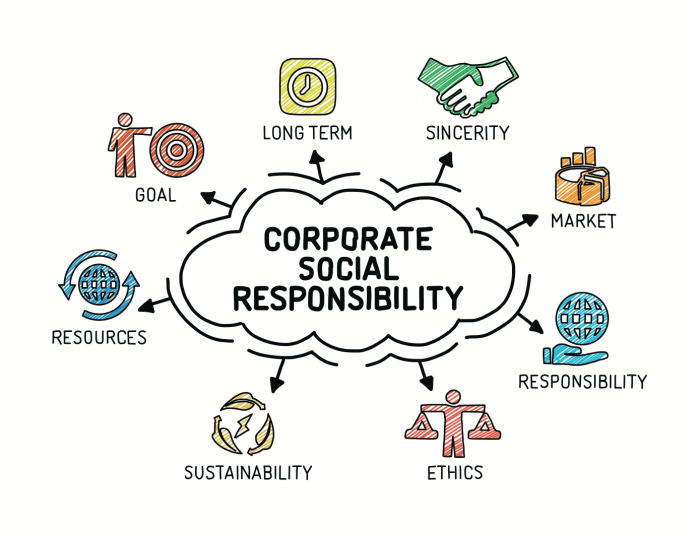Corporate social responsibility is more than just a buzzword – it’s a powerful tool that companies can wield to make a positive impact. From ethical business practices to stakeholder engagement, this topic delves into the key elements and strategies that drive meaningful change in the business world.
Overview of Corporate Social Responsibility (CSR)

Corporate Social Responsibility (CSR) refers to a company’s initiatives to take responsibility for its impact on environmental and social well-being. It involves going beyond legal obligations to contribute to the greater good.
Importance of CSR in Business Practices
- Enhances company reputation: CSR initiatives help build a positive image for the company in the eyes of consumers, investors, and the community.
- Attracts and retains talent: Employees are more likely to stay with a company that demonstrates a commitment to social responsibility.
- Improves customer loyalty: Consumers are increasingly drawn to brands that engage in ethical practices and give back to society.
- Drives innovation: CSR can lead to new ideas and solutions that benefit both the company and society as a whole.
Benefits of Implementing CSR Initiatives for Companies
- Cost savings: Implementing sustainable practices can lead to reduced energy consumption and waste, ultimately saving the company money.
- Risk mitigation: By addressing social and environmental issues, companies can minimize the risk of negative impacts on their operations.
- Long-term growth: CSR initiatives can contribute to long-term success by fostering trust with stakeholders and creating a more sustainable business model.
- Competitive advantage: Companies that prioritize CSR often stand out from their competitors and attract more customers who align with their values.
Elements of CSR

Corporate Social Responsibility (CSR) encompasses various key elements that companies can integrate into their business practices to contribute positively to society and the environment. These elements include ethical business practices, sustainability initiatives, community involvement, and environmental stewardship.
Ethical Business Practices
Ethical business practices are essential components of CSR as they involve operating with honesty, integrity, and fairness in all business dealings. Companies can incorporate ethical practices by adhering to legal regulations, promoting transparency in their operations, and treating employees, customers, and stakeholders ethically.
Sustainability Initiatives
Sustainability plays a crucial role in CSR initiatives as it involves meeting the needs of the present without compromising the ability of future generations to meet their own needs. Companies can incorporate sustainability by implementing environmentally friendly practices, reducing carbon emissions, conserving natural resources, and supporting renewable energy initiatives.
Community Involvement
Community involvement is another key element of CSR, as it focuses on giving back to the communities in which companies operate. This can include supporting local charities, volunteering time and resources, and engaging in philanthropic activities that benefit society.
Environmental Stewardship
Environmental stewardship is a vital aspect of CSR that emphasizes the responsibility of companies to protect and preserve the environment. Companies can demonstrate environmental stewardship by reducing waste, recycling materials, minimizing pollution, and implementing eco-friendly practices in their operations.
CSR Strategies
Corporate Social Responsibility (CSR) strategies are essential for companies looking to make a positive impact on society while also benefiting their business. By implementing effective CSR programs, companies can strengthen their brand reputation, build customer loyalty, and contribute to sustainable development.
Community Engagement
One common CSR strategy is community engagement, where companies actively participate in local initiatives and projects to support the communities where they operate. For example, Starbucks has a Global Farmer Fund program that helps coffee farmers in developing countries access capital and resources to improve their livelihoods.
Environmental Sustainability
Another important CSR strategy is environmental sustainability, where companies focus on reducing their environmental impact through initiatives like recycling, energy conservation, and carbon offset programs. Patagonia, a well-known outdoor apparel company, has a Worn Wear program that promotes the repair and reuse of their products to reduce waste.
Employee Volunteer Programs
Companies can also implement CSR strategies through employee volunteer programs, where employees are encouraged to donate their time and skills to support charitable causes. Google offers its employees paid time off to volunteer in their communities, which not only benefits the causes they support but also boosts employee morale and engagement.
Supply Chain Transparency
Maintaining supply chain transparency is a crucial CSR strategy that involves ensuring ethical practices and sustainability throughout the supply chain. Nike has made significant strides in this area by implementing programs to monitor and improve labor conditions in their factories, demonstrating their commitment to fair labor practices.
Philanthropic Initiatives
Lastly, companies can engage in philanthropic initiatives as part of their CSR strategies, donating a portion of their profits to charitable organizations or funding projects that align with their values. TOMS Shoes, known for its One for One model, donates a pair of shoes to a child in need for every pair purchased, showcasing their commitment to making a difference in the world.
Stakeholder Engagement in CSR
Engaging stakeholders in CSR efforts is crucial for companies to build trust, credibility, and long-term relationships with the community, employees, customers, and investors. By involving stakeholders in decision-making processes, companies can ensure that their CSR initiatives align with the needs and expectations of those affected by their operations.
Importance of Stakeholder Engagement
Effective communication of CSR activities to stakeholders is essential for companies to demonstrate their commitment to social responsibility. Companies can utilize various channels such as social media, annual reports, websites, and community events to keep stakeholders informed about their CSR initiatives and progress.
Role of Transparency in Building Trust
Transparency plays a vital role in building trust with stakeholders. By openly sharing information about their CSR practices, companies can demonstrate accountability and integrity. Transparency also allows stakeholders to assess the impact of CSR activities and hold companies responsible for their commitments.
Challenges and Criticisms of CSR: Corporate Social Responsibility
Implementing CSR initiatives can come with its fair share of challenges and criticisms that can hinder the overall impact and effectiveness of these efforts. It is essential for companies to address these issues to ensure meaningful CSR outcomes.
Common Challenges Faced by Companies, Corporate social responsibility
- Lack of clear guidelines and standards for CSR implementation.
- Difficulty in measuring the impact and outcomes of CSR initiatives.
- Resource constraints and budget limitations for implementing comprehensive CSR programs.
- Resistance from internal stakeholders who may not fully support CSR initiatives.
- Complexity in aligning CSR goals with the overall business strategy.
Criticisms of CSR
- Accusations of greenwashing, where companies exaggerate or misrepresent their environmental efforts for positive public relations.
- Tokenism, where companies engage in CSR activities merely for symbolic gestures without genuine commitment to social responsibility.
- Critics argue that CSR can be a distraction from addressing core business practices that may be harmful to society or the environment.
- Skepticism towards the authenticity and sincerity of CSR initiatives, especially when companies have a history of unethical behavior.
Overcoming Challenges and Addressing Criticisms
- Develop clear CSR guidelines and standards to ensure transparency and accountability in implementation.
- Invest in robust impact measurement tools to track the effectiveness of CSR programs and communicate results to stakeholders.
- Allocate adequate resources and budget for CSR initiatives to ensure comprehensive and sustainable social and environmental impact.
- Engage with internal stakeholders through communication and education to garner support for CSR initiatives and integrate them into the company culture.
- Align CSR goals with the core business strategy to ensure that social responsibility is embedded in the company’s operations and decision-making processes.





